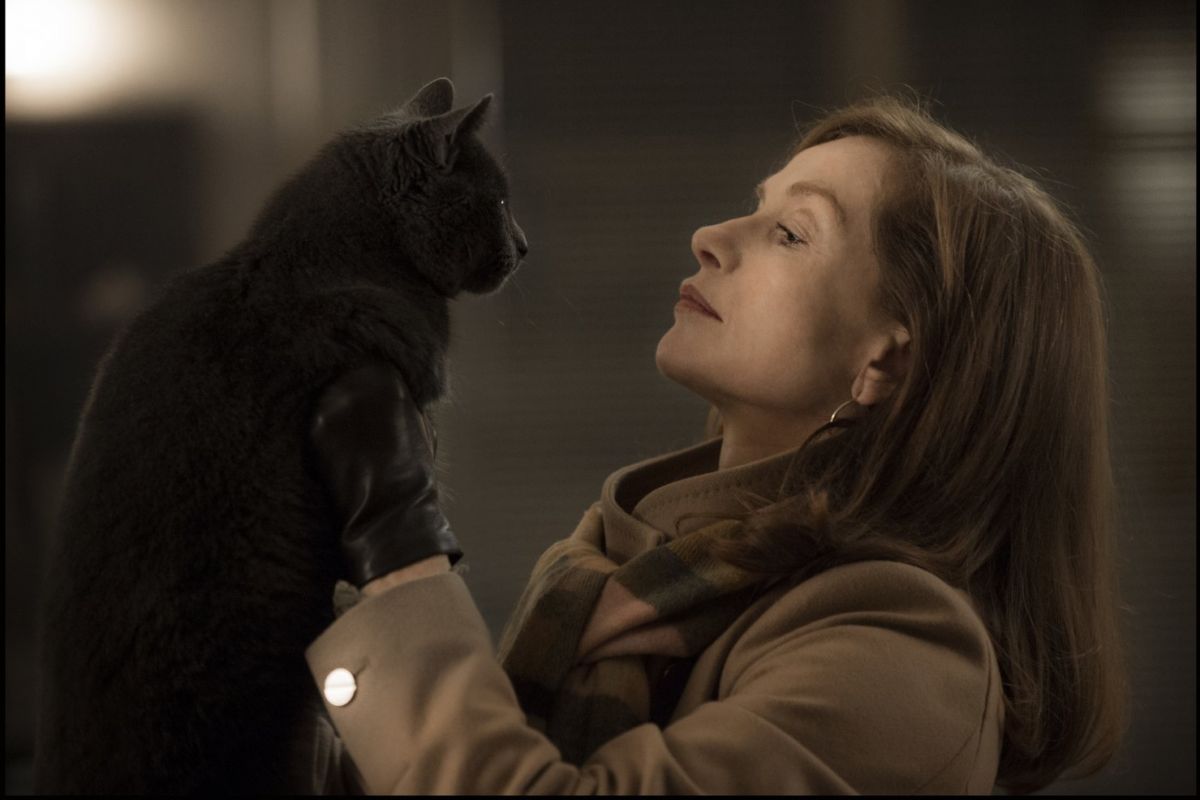
 At its essence, Things to Come examines that period in life
which is on the verge of change in the lives of many people in their
later middle age, a time when the kids are grown up and have moved on
out of the house, when parents are ailing or have passed on, or those
who are in those years are planning for their lives ahead once
retirement comes upon them. It's usually a time following a life
that has been free of major changes, as people have learned what they
can in school, have settled on a career and who they will love and
build a family with, and have grown into their social circles and
extracurricular activities that will define them. In other
words, it's the last period for normalcy before the those who are
advancing in years have to think about what they're going to do for
the rest of their lives in retirement, which is something they haven't had to think
of since their youths.
At its essence, Things to Come examines that period in life
which is on the verge of change in the lives of many people in their
later middle age, a time when the kids are grown up and have moved on
out of the house, when parents are ailing or have passed on, or those
who are in those years are planning for their lives ahead once
retirement comes upon them. It's usually a time following a life
that has been free of major changes, as people have learned what they
can in school, have settled on a career and who they will love and
build a family with, and have grown into their social circles and
extracurricular activities that will define them. In other
words, it's the last period for normalcy before the those who are
advancing in years have to think about what they're going to do for
the rest of their lives in retirement, which is something they haven't had to think
of since their youths.
Isabelle Huppert (Louder Than Bombs,
The Disappearance of Eleanor Rigby) stars as philosophy professor Nathalie Chazeaux,
having lived a comfortable life for many years in her job, in her
marriage, and in her home life. Her children have grown and moved
away, but she still needs to take some care, mostly of her mother
(Scob, Gemma Bovery) Yvette, who is suffering from dementia and bouts of depression that
has her threatening suicide on occasions when left alone too long,
requiring looking into assisted living to support. The college in
which Nathalie teaches is also undergoing some tumult of late, as
students have taken to protests because of the uncertainty of their
futures, both academically and politically. A but more change occurs
in Nathalie's life when Fabien (Kolinka, Love Crime), an activist who was once one of her
former students, reconnects with her, finding a bond with each other
as they go through some more trials in their personal lives. Pushed
out of her comfort zone with setbacks both personal and professional,
Nathalie has to re-evaluate herself in a way she hasn't had to since
the time of her youthful independence.
Written and directed by
Mia Hansen-Love (Eden, Goodbye First Love), herself the daughter of two philosophy professors
(who, perhaps not coincidentally, divorced when she was in her
twenties), Things to Come is a non-judgmental character
study of an intellectual woman whose passion for truth and philosophy
supersedes many of her other loves, including for her husband (Marcon,
Marguerite). She has
published textbooks that are highly esteemed, but they haven't result
in many sales. Her book publisher wants to make some cosmetic changes
to her textbook in order for it to stand out among the other boring
books on the shelf, but Nathalie will have none of it, as she feels it
completely rails against everything she has fought so hard to achieve.
As with just about every film in which she appears, Isabelle
Huppert is commanding, offering a three-dimensional portrait of a calm
and collected woman trying to traverse the tightrope of emotions while
every piece of her life begins to change in drastic ways. Her rational
thought, though, is what guides her, not given to bouts of emotion,
save for such occasions as when someone has removed valued, personally
annotated texts from great philosophers from her personal library
without her consent. Whether looking happy, annoyed, or deeply
disturbed, Huppert can turn emotions on a dime to give a richly
nuanced performance that brings her character to life in a very
authentic way. This is a woman who lives for free thought,
finding much more value in her intellectual pursuits, which she says
is enough to sustain her, though that can only be a temporary respite
from the rest of her life coming to a void.
Perhaps it is no surprise that Nathalie finds value in her gardening,
methodically sowing the literal seeds to what has become a lovely spot
at the family's summer home, though all of her figurative seeds have
begun to stop bearing fruit, and even her real garden becomes
something for which she can no longer find responsibility. She
comments in a most cynical moment that, "After 40, women are fit for
the trash," implying that her romantic life will be over, because she
won't seek an older man and could never live with a younger one,
though she also feels that there's more to life to sustain her needs.
What she soon discovers is that there is a reason to live and love
things again, filling the void with new desires and pursuits; as the
title implies, it is the anticipation of things to come that draws out
one's emotional fulfillment.
Her character, who processes troubles through thinking through them
rather than feeling, finds deeper connection to others who feel the
same, namely Fabien, to whom she is seen as a mentor, though she does
come to feel a certain revulsion on the extent to which he thinks
rather than feels, resulting in an anarchist position, as evidenced by
her dismay in finding the "Unabomber Manifesto" among his books in his
library at the commune he currently calls home. She can turn off
emotions just as quickly, just as when her husband, who has been on
the outs, suggests that he has no Christmas plans, and she seems to no
longer care at all about the fact that he might spend the holidays
alone. "I'm lucky to be fulfilled intellectually," is the strength she
needs to get by when things begin to fall apart around her from an
emotional standpoint.
Much like the heroine at the heart of
Hansen-Love's humanist picture, Things to Come is not fraught with emotional melodrama,
proceeding forward despite its turbulence in a manner that is capable
and functional even when the chips seem down. However, despite
all of the admirable qualities, I suppose it is a bit ironic that I
did not find a good deal of the story to be truly compelling beyond
the impeccable acting and the more evocative aspects of the thematic
underpinnings. In other words, I find Huppert much more
fascinating to watch playing Nathalie than I do in anything within
the character of Nathalie herself.
I praise Hansen-Love for her ability to construct nuanced characters
and to draw out naturalistic conversations, enough to give her film a
recommendation, but I hesitate to lavish a rave upon a film where I
struggle to find enough interest in those very same characters and
conversations to feel I would want to spend ninety-plus minutes with
them but for the sake of this review.
Qwipster's rating:







©2016 Vince Leo

 At its essence, Things to Come examines that period in life
which is on the verge of change in the lives of many people in their
later middle age, a time when the kids are grown up and have moved on
out of the house, when parents are ailing or have passed on, or those
who are in those years are planning for their lives ahead once
retirement comes upon them. It's usually a time following a life
that has been free of major changes, as people have learned what they
can in school, have settled on a career and who they will love and
build a family with, and have grown into their social circles and
extracurricular activities that will define them. In other
words, it's the last period for normalcy before the those who are
advancing in years have to think about what they're going to do for
the rest of their lives in retirement, which is something they haven't had to think
of since their youths.
At its essence, Things to Come examines that period in life
which is on the verge of change in the lives of many people in their
later middle age, a time when the kids are grown up and have moved on
out of the house, when parents are ailing or have passed on, or those
who are in those years are planning for their lives ahead once
retirement comes upon them. It's usually a time following a life
that has been free of major changes, as people have learned what they
can in school, have settled on a career and who they will love and
build a family with, and have grown into their social circles and
extracurricular activities that will define them. In other
words, it's the last period for normalcy before the those who are
advancing in years have to think about what they're going to do for
the rest of their lives in retirement, which is something they haven't had to think
of since their youths.